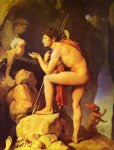The challenge of historicism post Hegel is not diagnosing ghosts for the metaphors by which they organized their lives or elaborating upon the tropes that kept them from seeing the plain truth before them, nor is it in diagnosing the dead's schizophrenia and condemning their certitude that phantoms were real. Explaining to one another that they were all infected and limned by the absurd "seven races of man" and exploring the narrative of such a belief is not frightening. No. What the anxiety of historicism is the awareness it commands of us that we ourselves are hooded by a metaphor we speak so often that we no longer hear it and the dire likelihood that many things we know to be obviously true, even clear states of physical being, are just as much phantasms as the "murderer's brow ridge."
Once we learn about Hegel's idea of history as an ineffable force, we're confronted with a paradox and a panic. The paradox is that, if history is determining and no person is ever free of history, then how was or is anyone ever able to come to the realization that history is a determining force? It would have to be the historical moment of Hegel that made it necessary and fitting for Hegelianism to occur, because there is no room for "genius" to be effective. The panic is that the student of history as much as the subjects of historical narratives is being controlled by the historical moment.
In the 1970's American intellectuals devised the notion of "paradigms" and "paradigm shifts." Around the same time, Michel Foucault wrote about the "episteme." Both are related, if not genealogically descended, from Hegelian historical determinism. In both cases, every generation or epoch of humanity organizes not merely what it knows, but what it can know along specific framing metaphors. It may be "father/family" that acts as a prefiguring metaphor in an age -- showing up in everything from discourse about the king/nation to church/flock to landlord/tenant to market regulations -- or it may be "inviolability of the body." Regardless, the who world of speakers and thinker is captured before it even emerges by a pattern of perception, processing and speaking. Political and economic power flows through these figures, but human knowledge itself moves only when "revolutions" occur in these frames.
We can reaffirm this anxiety, if we ever start to calm down or feel hopeful, by resorting to Marxism or remembering the painful lessons of Wittgenstein. According to the former, super-structure is only ever a reflection of base conditions. Marx never quite got around to writing a book about art, but the Marxists have hardly been able to shut up. Let's just say that what exists in language is not anything so coarse as Immanuel Goldstein's NewSpeak from 1984, nor is knowledge and artistic expression controlled by the capitalist directly, but what we can know and say and ask is at least engaged in a project of social and economic control. It gets that way coincidentally, and not because someone at Goldman-Sachs declares it, but ideas that spread do so because they are going through expensive media that is funded by investors, and "successful" persons are emulated, so individual, class-conscious, and free expression is at long odds.
Wittgenstein simply casts a doubt on the status of interrogation. He does not make knowledge less likely, but he points out so clearly that our words control our thoughts that he makes any honest person a skeptic about even asking questions.
No one wants to hear that he or she is a fool, and no one prospers by talking about the emperor's nakedness. However, I'm about to suggest that something "obvious" is actually artificial and mercantile.
I have dealt with being a religious intellectual for a long time. As I have gotten older, I have recognized that the dormitory conversation about "is too!" "is not!" in regard to God never grows up, because every year a new group comes into the dorm room. Therefore, I try not to get involved with naive arguments on the subject. People who argue their passions instead of their reason are impossible to reason with, so, since my religion forbids my slapping them, I really don't have much to say.
However, I was drawn on the subject too recently. I get annoyed by the "Stupid people are religious" line. I can have 20+ years of college education, and the other person can have a high school degree, but that person is much "smarter" and "knows" more because he (or she) does not believe in God. After all, he is following the course of Reason and Science. Only people who don't know anything believe in a "magic sky father."
What I said there caused enormous hurt. I said, "You bought your atheism from the store, and it was on sale, cheap." I pointed out that all of his argument was a script written for him and a discourse of power, that he had swallowed a cultural narrative that had been invented. He had not discovered it, had not bravely achieved courageous individualism against the repressive hoards, and he had not surmounted some vast intellectual height. He had gone along with a cliche.
That is what I'd like to discuss, perhaps in my next, since this is already long and has big words. Atheism is an invented concept. It is a cultural moment that has a history and functions in history. Like most of the poisonous metaphors that limit perception, it tells a lie about itself. Like most of the successful cultural adhesions of the last century, it serves capital.


